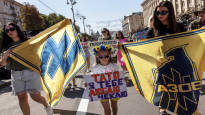In July, Ukraine celebrated a rare symbolic victory: the commanders of the Azov brigade, who were prisoners of war in Russia, returned to Ukraine.
– We will bring our heroes home, announced the President of Ukraine Volodymyr Zelenskyiand the crowd cheered.
The return was behind a lot of work: First, Ukraine and Russia negotiated a prisoner exchange, in which Russia handed over the Azov commanders to Turkey. In exchange, Ukraine handed over to Russia, among other things, the Russian president Vladimir Putin a personal friend Viktor Medvedchuk. Then Turkey decided to hand over the Ukrainian commanders to their homeland, without informing Russia. The act practically destroyed Turkey’s reputation as an impartial negotiator in the war.
What made these men Denys Prokopenko, Svyatoslav from Palamar, Serhi from Volynskyi, From Oleh Khomenko and Of Denys Shlehanso important?
Controversial heroes
The volunteer fighters of Azov became national heroes in Ukraine in the spring of 2022 at the latest.
Prokopenko and his soldiers then crawled starving and wounded in the pits of the Azovstal steel factory. The long drawn-out battle for the city of Mariupol was practically lost, and the city was captured by Russian forces. No help was forthcoming, but the Azovstal troops persevered.
– Azovstal means Azov steel. Ukrainians describe so that, like steel, these people did not bend, describes the docent of military sciences Ilmari Käihkö.
– These people became heroes in Ukraine.
At the same time, the Azovstal fighters were strong symbols for the opposing side as well. The Russian leadership had named them as the Nazis, because of which it attacked Ukraine. According to Russia, it was not a war against an independent state, but a special operation to defeat the Nazis who had gained power in Ukraine.
Experts were sure that the Azov commanders would not make it out of the factory alive, and if they did, Russia would either execute them or try them in spectacular trials, says an analyst at Stockholm’s Eastern European Research Center Andreas Umland.
But they survived, first to Russia as prisoners and then back to Ukraine.
– I was really surprised, says Umland.
– Azov was defined in Russian propaganda as an SS unit of the Ukrainian Nazis. The whole purpose of the war was to catch them, and then they were allowed to return. I wondered what the Russians would think about this.
Of course, Russia had not intended to let the commanders go all the way to Ukraine, but the very handover to NATO country Turkey contradicts Russia’s story.
According to Käihkö, Russian nationalists in particular have been dismayed by the handover of the Azov commanders.
– They see this as a disappointment and maybe a betrayal. This underlines the fact that Russia’s justification for attacking Ukraine is not watertight.
Far-right symbols still in use
The real causes of the war date back to other places, but the Russian story of the Nazis in Azov did not come out of nowhere.
Azov started as a movement in the far-right circles of Eastern Ukraine, and far-right members from other parts of the world have traveled to its trainings for years. In the United States, some congressional representatives have demanded that Azov be declared a terrorist organization.
The controversial emblems combine the black sun and wolfsangel, i.e. wolf hook. Both are symbols used by Nazi Germany at the time. In Western countries, they belong to the neo-Nazi image. The detective quickly finds pictures of Azov fighters also wearing, for example, Nazi Germany’s Waffen SS shirts or doing Nazi salutes.
Read more about Azov here.
During the war, efforts have been made to separate the military side of Azov from the political side, but for example the far-right founder Andrii Biletsky is still a commander in the Azov brigade. Azov also still uses far-right symbols, says Käihkö.
– Strategically, it is extremely stupid for Ukraine to use them. It underscores Russian propaganda, but it’s hard to see what Ukraine gains from it. Why doesn’t Ukraine simply ban the use of these marks on uniforms?
On the other hand, one could just as well ask why the Finnish Air Force has not completely abandoned the use of the swastika flag, Käihkö ponders.
– Its preservation is obviously important to some people in Finland, and it is probably the same in Ukraine.
It seems that nobody in the war-torn country is interested in whether the Azov commanders who have now returned home support far-right ideology.
Commander Denys Prokopenko commented for the first time in Ukraine that they will return to the front.
– All Ukrainians say that he is a great commander and the hope of the future. During the war, as long as you do the right things, defend Ukraine, it doesn’t matter what ideology you support, says Käihkö.
Prokopenko has told in Azov’s Musta suirno magazine that he got the inspiration to become a fighter from his Karelian grandfather, whose family died in the Winter War. He hated the Russians. According to Käihkö, many other Ukrainians also feel that Finland and Ukraine have a common historic fight against Russia.
Umland reminds that there is a natural reason for the nationalism that has reared its head in Ukraine since 2014 – Russia’s conquest efforts.
– That is the difference between Azov and many other western far-right groups who want to free their country from some Jewish capitalist conspiracy or freemasons. In Ukraine, the enemy is the real army that has crossed the borders.
Turkey’s role is confusing
Russia has been angry about the return of the Azov commanders to Turkey. Turkey’s role has indeed caused wonder: What made a country that had remained as neutral as possible for a long time betray Russia?
Kaihkö guesses that the president of Turkey Recep Tayyip Erdoğan has followed the protest of the Wagner forces on Midsummer and stated that Putin’s position is weak.
– It could be that Erdoğan has considered that Russia is weak and cannot do anything in revenge.
